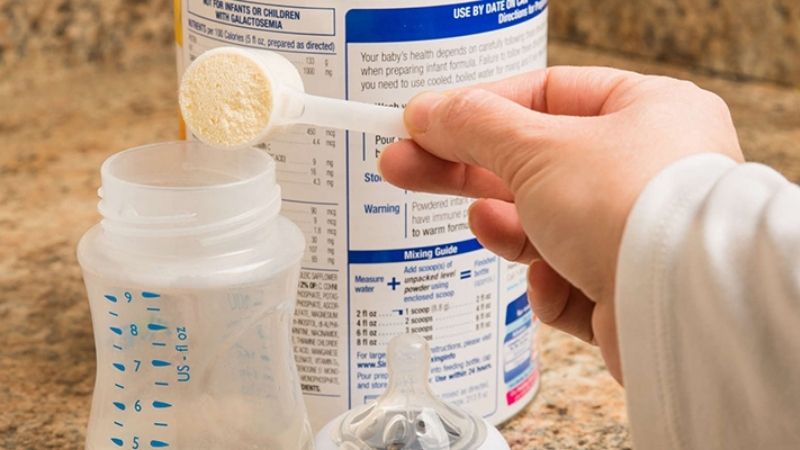Breastfeeding is a beautiful thing, but weaning your baby off it can be challenging. Moms often have to deal with engorged breasts and a fussy, irritable baby who misses nursing. To make the weaning process easier, try these tips:
1. Disguise Your Breasts
 Disguise your breasts
Disguise your breasts
One successful strategy is to disguise the appearance of your breasts. For example, try wrapping your hair around your nipples and tying it in a knot, or apply lipstick to your nipples. You can also use a face mask to cover your breasts. Just remember to be creative and lighthearted in your explanation to your baby, and never try to scare them!
2. Spend Some Time Away from Your Baby
Your baby is used to your scent and will crave nursing whenever they’re near you. To help them forget about nursing, spend some time apart. Consider staying with relatives for a while or going to work without nursing during the day. Sleeping separately at night can also help your baby forget about nursing. They might cry or fuss at first, but they’ll gradually adjust and stop demanding to nurse.
3. Apply Bitter or Spicy Substances to Your Breasts
 Apply bitter or spicy substances to your breasts
Apply bitter or spicy substances to your breasts
Some mothers find success in applying substances like oil to their nipples. The slight spiciness will deter the baby from nursing. Alternatively, you can try rubbing bitter melon on your nipples. The bitter taste will immediately turn your baby away from nursing.
4. Eat Garlic to Deter Nursing
 Eat garlic to deter nursing
Eat garlic to deter nursing
While breastfeeding, it’s best to avoid garlic, as it can make your milk unappealing to your baby. However, when it’s time to wean, garlic can be your secret weapon! Eating garlic-infused foods or dishes with a strong garlic presence will make your milk less desirable to your little one.
5. Drink Herbal Teas to Reduce Milk Supply
 Drink herbal teas to reduce milk supply
Drink herbal teas to reduce milk supply
Certain herbal teas, like jasmine, peppermint, bitter leaf, parsley, basil, and mulberry leaf tea, can help reduce your milk supply. As your milk supply decreases, your baby will lose interest in nursing. If you’re concerned about your baby’s nutrition during this transition, simply increase their solid food intake or the frequency of their meals.
6. Reduce the Duration of Nursing Sessions
Another strategy is to gradually reduce the number of nursing sessions. Instead of nursing at a particular time, offer your baby formula or solid food. By nursing less frequently, your milk supply will naturally decrease, and your baby will eventually lose interest.
7. When to Start Weaning
To make the weaning process smoother and less upsetting for your baby, it’s essential to do it gradually and at a steady pace. If you’ve been exclusively breastfeeding and haven’t introduced other sources of nutrition, it will be challenging to wean your baby suddenly.
 The right time to start weaning depends on your baby’s condition
The right time to start weaning depends on your baby’s condition
Once your baby reaches six months, you can start introducing solid foods and nutrient-rich complementary foods. Gradually replace breastfeeding sessions with these new foods. Eventually, your baby will lose interest in nursing and be fully weaned.
There’s no fixed age to determine when to wean your baby. It depends on their overall health and development. If you feel your baby is strong and able to sit up independently, it’s a good time to start weaning and introducing alternative sources of nutrition.
8. Important Considerations for Weaning
 Important considerations for weaning
Important considerations for weaning
When is the right time to wean?
There’s no one-size-fits-all answer to this question. Parents can choose to wean their children early or late, depending on their individual circumstances. Weaning is a process of gradually transitioning a child from drinking milk to eating adult food.
Some milestones that indicate a child may be ready for weaning include: the ability to sit up straight and roll over, saying 2-3 words in addition to “mom” and “dad,” eating porridge and soft rice, recognizing colors, and climbing up and down stairs.
Note: The ideal age for weaning is between 18 and 24 months, provided the child is in good health and isn’t frequently ill.
Should I allow comfort nursing during weaning?
The answer is NO. Comfort nursing during weaning can make it harder for your child to fully wean and may lead to a “relapse” of nursing. Additionally, your milk supply will be inconsistent during weaning, and the nutritional content won’t be as high as it was before.
These are some simple yet effective tips for weaning your baby off breast milk. If you’re facing challenges, give these methods a try!

































